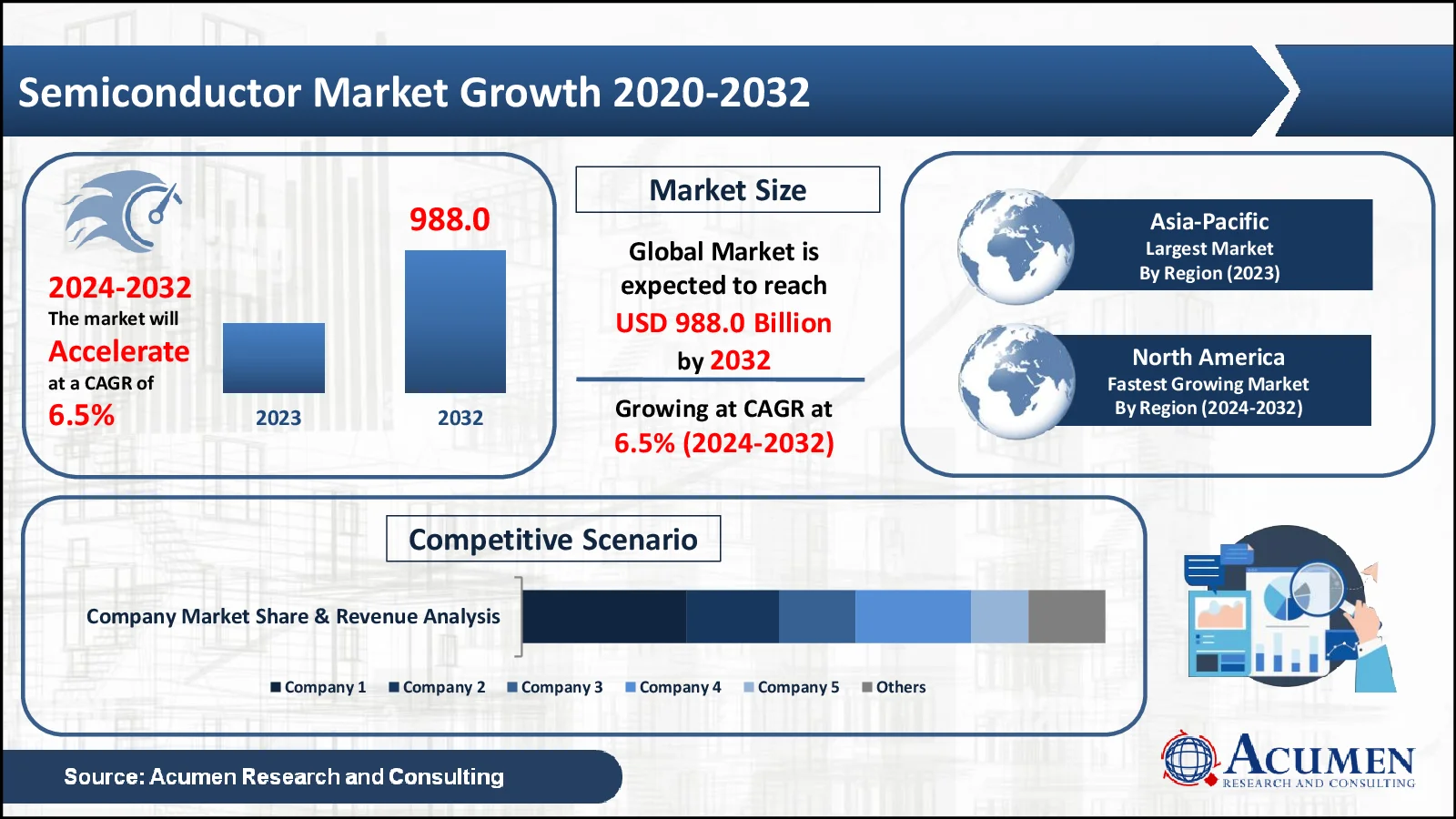Semiconductor Market Size to Reach USD 988.0 Billion by 2032
The Semiconductor Market, valued at USD 562.1 Billion in 2023, is anticipated to surpass USD 988.0 Billion by 2032, reflecting a projected CAGR of 6.5%
The semiconductor market is undergoing a transformation, fueled by unparalleled technological developments, rising consumer electronics demand, and an increased reliance on digital solutions across multiple industries. Semiconductors, as the essential components of electronic devices, provide the foundation of today's technological ecosystem, enabling the operation of smartphones, computers, automobile electronics, and industrial machinery. The market is expanding rapidly as technologies such as artificial intelligence (AI), the internet of things (IoT), and 5G connectivity transform the landscape.

Semiconductor Market Statistics
- The global semiconductor market was valued at USD 562.1 billion in 2023
- The market is projected to increase at a stable annual pace of 6.5% from 2024-2032
- Asia-Pacific accounts for 51% of the semiconductor market
- North America is growing at a CAGR of 7.3% within the semiconductor market
- The memory devices component category has the largest earning semiconductor market
- The semiconductor market has seen significant revenue growth from networking & communication application
- The semiconductor market is experiencing a trend of rising emphasis on miniaturization enables the development of next-gen nano-sized semiconductors
Access Table Of Content: https://www.acumenresearchandconsulting.com/table-of-content/semiconductor-market
Semiconductor Market Dynamics
Global Growth Drivers
Several essential reasons drive semiconductor industry growth, including increasing acceptance of AI and machine learning applications, the proliferation of IoT devices, and the rapid deployment of 5G networks. These technologies necessitate modern semiconductors capable of high-speed computation, efficient power management, and improved connection. Furthermore, the global trend toward automation in industries such as manufacturing, healthcare, and logistics is driving up the demand for semiconductors. Autonomous vehicles, for example, necessitate high-performance CPUs for real-time data processing, navigation, and decision-making, which contribute significantly to market growth.
Another major factor is the growing demand for consumer electronics, particularly in emerging markets. Smartphones, laptops, and gaming consoles are becoming more affordable and accessible, increasing the demand for semiconductor components. Furthermore, the trend toward renewable energy and smart grids opens up new potential for power semiconductors, which play an important role in energy conversion and management.
Challenges and Restraints
Despite its potential growth trajectory, the semiconductor sector faces a number of obstacles, including supply chain disruptions, geopolitical tensions, and the high cost of research and development. The global semiconductor shortage, exacerbated by the COVID-19 pandemic, has emphasized supply chain vulnerability and the importance of manufacturing location diversification. Furthermore, rising trade disputes and export restrictions on crucial resources jeopardize market stability.
Semiconductor manufacturing's high complexity and capital-intensive nature can pose considerable challenges. Creating cutting-edge fabrication facilities (fabs) necessitates significant investment, which can often reach billions of dollars. This costly burden is exacerbated by the quick pace of technology improvement, needing ongoing updates and innovations.
Opportunities in the Semiconductor Market
The semiconductor sector offers numerous prospects, particularly in AI, IoT, and automotive applications. AI-powered semiconductors, which can handle large datasets and execute sophisticated computations, are gaining popularity in industries ranging from healthcare to finance. IoT devices, on the other hand, require specialized chips that favor low power consumption and dependable communication, resulting in a small but profitable market segment.
The automotive industry is another huge development opportunity. Electric vehicles (EVs) and self-driving technologies rely significantly on semiconductors for battery management, sensor integration, and vehicle-to-everything (V2X) connectivity. Governments around the world are encouraging the adoption of EVs through subsidies and infrastructural development, driving demand for automotive semiconductors.
Furthermore, the introduction of 5G technology is creating new opportunities for semiconductor applications. The rollout of 5G networks demands better semiconductors for base stations, smartphones, and other connected devices, which in turn drives semiconductor innovation and investment. Companies are also looking at quantum computing and improved packaging technologies, which have the potential to significantly improve transistor performance and efficiency.
Semiconductor Market Segmentation
The worldwide semiconductor market is divided into 3 segments: component, application, and regional markets
- Component: memory devices, logic devices, analog IC, MPU, discrete power devices, MCU, sensors, and others
- Application: networking & communication, data processing, industrial, consumer electronics, automotive, and government
- Regional: The Middle East & Africa, Asia-Pacific, Europe, Latin America, and North America
Semiconductor Market Regional Outlook
Asia-Pacific dominates the worldwide semiconductor business, accounting for a large portion of production and consumption. Major semiconductor manufacturers and suppliers, including TSMC, Samsung Electronics, and SK Hynix, are based in China, Taiwan, South Korea, and Japan, respectively. The region's prominence can be due to its strong electronics industry, favorable government regulations, and significant investments in R&D.
China, in particular, is actively pursuing self-sufficiency in chip production through efforts such as the "Made in China 2025" plan. The country wants to lessen its reliance on foreign suppliers and gain a competitive advantage in sophisticated semiconductor technologies. Taiwan, on the other hand, remains the leader in foundry services, with TSMC being the world's largest contract chipmaker.
North America, led by the United States, is a significant player in the semiconductor market, thanks to its strong emphasis on innovation and superior production capabilities. The region is home to industry behemoths like Intel, Qualcomm, and NVIDIA, which are at the forefront of producing cutting-edge technologies. The United States government's CHIPS Act, which aims to increase domestic semiconductor production, underlines the industry's vital importance in sustaining technical leadership and national security.
Semiconductor Market Players
Semiconductor companies profiled in the report include Intel Corporation, Qualcomm, STMicroelectronics, ASML, AMD (Advanced Micro Devices), Infineon Technologies, Micron Technology, Samsung Electronics, Texas Instruments, Broadcom, and NVIDIA.
Enquire Before Buying https://www.acumenresearchandconsulting.com/inquiry-before-buying/1848
Receive our personalized services and customization by clicking here https://www.acumenresearchandconsulting.com/request-customization/1848
Mr. Richard Johnson
Acumen Research and Consulting
India: +91 8983225533
E-mail: [email protected]


